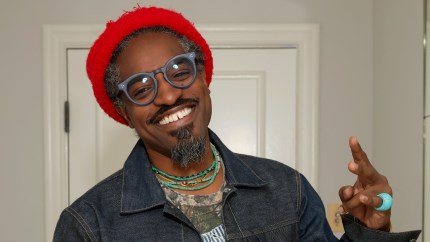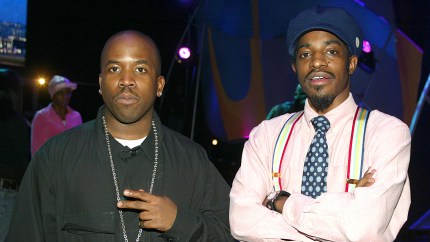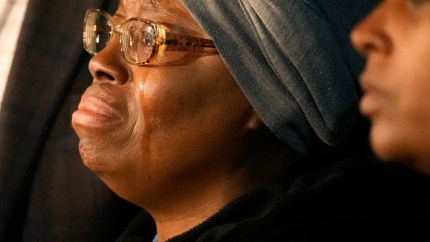On Rico Wade, the South and Outkast’s ‘Southernplayalisticadillacmuzik’ 30 years later
OPINION: Outkast’s landmark debut album celebrates its 30-year anniversary on the same day one of its chief architects, the legend Rico Wade, is being laid to rest.

Editor’s note: The following article is an op-ed, and the views expressed are the author’s own. Read more opinions on theGrio.
I never had the chance to meet Rico Wade. Hell, I’ve never even seen the man in person. Somehow, though, he’s loomed large over a substantial part of my early hip-hop education and a sound that would come to define how I viewed myself in the world. For that reason, I’ve always felt a certain indebtedness to Organized Noize — the production team of Rico Wade, Sleepy Brown and Ray Murray — who was responsible for that sound. If you were a fan of Outkast and Goodie Mob (and the other projects from the Dungeon Family collective), ON likely held a special place in your heart as well.
I got the news of Rico Wade’s passing while I was at a soccer game for one of my kids. I stopped paying attention to the game almost immediately. Even though every article said the same thing, I read every single article I could find that mentioned his passing. I wanted it to be untrue as if he were a family member taken too soon. That’s what happens when art is how you remember cherished parts of your life. The reason he (and Organized Noize) took up that space is Outkast’s debut album, “Southernplayalisticadillacmuzik” a 17-track album that took a 14-year-old me on a ride through an Atlanta I was familiar with, giving me (and others like me) a hip-hop identity to latch onto. While the sounds of New York and Los Angeles dominated my music collection and the videos I saw, I’d never been to either city. The identity I gathered from those places was cosplay without context; I was trying things on but never felt like it truly related to what I could see. Outkast changed that with “Southern…”
“Southernplayalisticadillacmuzik” turns 30 years old on April 26, the same day that Rico Wade was laid to rest in Atlanta, the place that birthed the record. What a wild ride.
It’s fascinating to think of art that’s been part of your life consistently for three decades. Most of the classic era hip-hop not from the West Coast was present in my life but in bits and pieces. I knew the artists and the songs, but could I say I was there on day one? Not really. Outkast, though, was probably the first group that I could truly say I was invested in fully from the beginning. From the first time I saw the video for “Player’s Ball” to the album dropping and me getting a copy the day it came out. I couldn’t wait to dive into the world of Big Boi and Dre (now André 3000). I wanted in on their version of Atlanta, one that didn’t feel far away to me. “Southern…” dropped me right into the SWATS (an acronym for “Southwest Atlanta, too strong”) and gave me an education about life from those a bit older than me. That education stuck to my ribs and stayed there. I still listen to “Southern…” pretty regularly as the remix to “Player’s Ball” is one of the greatest songs in Southern rap history as far as I’m concerned. The piano riff that opens the remix gets me every single time. I feel it in my sha-na-na.
That’s what Rico Wade and Outkast gave me and presumably others. They gave us a soulful version of the hip-hop we’d been listening to with lingo that sounded like a stop at grandma’s house. I take Outkast … personally, as if their success is tied to my love for what they gave us culturally and musically. When I read that Rico Wade passed, it wasn’t just reading about another musical artist/executive; it was Rico Wade. It was one of the architects of the future of Atlanta.
Recommended Stories
Atlanta as we know it now doesn’t exist in the cultural zeitgeist if not for Rico, Organized Noize and Outkast. On the intro to “Player’s Ball,” Rico is the first voice you hear, and he’s talking about “a Black man heaven here …” That statement alone became part of the lore of Atlanta. While Atlanta had culture and a hip-hop scene before Outkast, everything changed with “Southernplayalisticadillacmuzik” — we had a group, a sound, a purpose and an aesthetic that reached the masses.
I suppose that I’m at this point in life where nostalgia starts to bring back some of the romance I felt as a youth. I probably make more of certain albums and artists than I ever truly felt upon discovering their music. But Outkast has been the group that remained constant in my identity and my relation to hip-hop; while Big Boi and André 3000 are a few years older than I am, I’ve essentially grown up with them as well. The reverence and nostalgia I feel is rooted in something tangible. That’s why the passing of Rico Wade at 52, which feels extremely young to a nearly 45-year-old, hits differently.
Rico was and is the epicenter of the cultural renaissance that Atlanta underwent and sustained for the past 30 years. Freaknik kicked in the door, but Outkast made it last forever. I am who I am today because of them, and I can’t thank them enough for that.
Rest in Power to Rico Wade. Hootie hoo.

Panama Jackson is a columnist at theGrio. He writes very Black things, drinks very brown liquors, and is pretty fly for a light guy. His biggest accomplishment to date coincides with his Blackest accomplishment to date in that he received a phone call from Oprah Winfrey after she read one of his pieces (biggest), but he didn’t answer the phone because the caller ID said: “Unknown” (Blackest).
Make sure you check out the Dear Culture podcast every Thursday on theGrio’s Black Podcast Network, where I’ll be hosting some of the Blackest conversations known to humankind. You might not leave the convo with an afro, but you’ll definitely be looking for your Afro Sheen! Listen to Dear Culture on TheGrio’s app; download it here.
More About:Entertainment

















